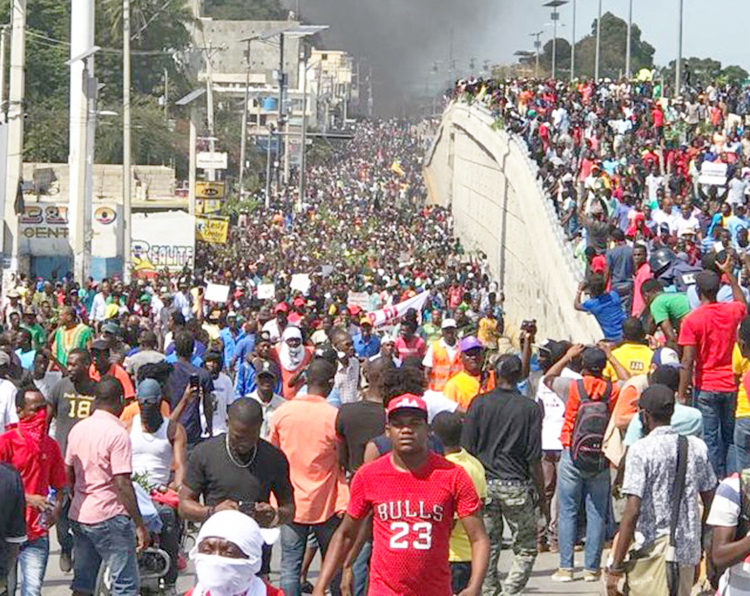Working people in Haiti have been mounting widespread protests since Feb. 7 demanding the resignation of President Jovenel Moise and Prime Minister Jean Henry Ceant. A social crisis has wracked the country since hurricanes hit in 2008, 2012 and 2016, a deadly earthquake in 2010 as well as a cholera epidemic. This all comes on top of decades of colonial plunder at the hands of the U.S. capitalist rulers.
Anger among Haiti’s youth has exploded, with thousands proclaiming, “We’re fed up!” They are protesting soaring inflation, joblessness and rampant corruption.
Despite pledging to fight graft, Moise’s government has failed to prosecute top officials accused of embezzlement.
In the capital, Port-au-Prince, and in most of Haiti’s largest towns, streets are blocked by burning tires or cars. At least seven people have been killed as police have moved to violently disperse protesters. Businesses, offices and schools have been closed. There are shortages of gasoline and food, medicines and hospital supplies.
After a week of silence, Moise made a prerecorded address in Creole Feb. 14. He announced that he would not step down to “leave the country in the hands of armed gangs and drugs traffickers.” He claimed he would take unspecified economic measures to “relieve our pain.”
Far from quelling the unrest, this fueled new protests. Bourgeois opposition leaders called his announcement “a declaration of war” against the Haitian people. They are trying to take advantage of the unrest, but offer no alternative.
Moise was elected president in February 2017 promising to create jobs and fight corruption. This soon proved hollow. He is nicknamed “Banana Man,” as he owns a string of businesses that include a number of plantations.
Ceant, who was installed as the new prime minister by Moise last September after a similar round of protests, promised Feb. 16 to cut government expenditures on bureaucracy by 30 percent.
“The situation has gotten worse,” Widler Saintil, a 35-year-old shopkeeper, told The Associated Press, adding that he would continue protesting until Moise resigns.
Tracy Hotta, a Canadian nurse, told CNN, “They’re very destitute down here. They’re taking desperate measures to try and make a change themselves.”
Washington has responded by evacuating “nonessential” personnel from its embassy and sending in extra security forces.
The U.S. rulers have a long record of military and political intervention in Haiti. The administration of President Donald Trump is trying to end temporary protected status for Haitians who came to the U.S. after the earthquake and hurricane damage.
Revolutionary Cuba, by contrast, has had an internationalist medical mission of volunteer doctors and nurses in Haiti since 1998. Such missions around the world are a hallmark of Cuban working people’s internationalism. They’ve been decisive in offering medical care to tens of thousands during the social catastrophes since. There are close to 600 Cuban medical personnel in Haiti today, continuing to offer free medical care in villages and towns across the country.


